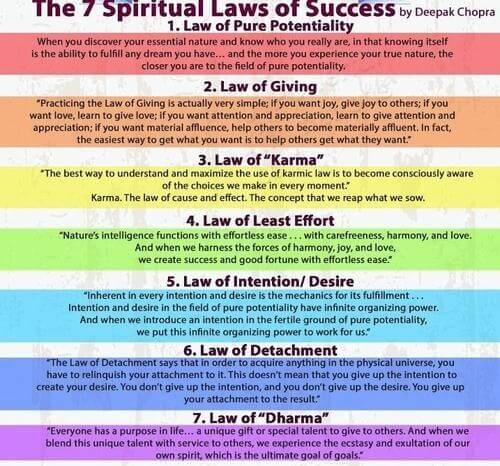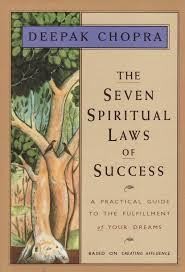Deepak Chopra‘s book, “The Seven Spiritual Laws of Success,” has been such a touchstone for me that I’m writing about each of the seven laws over the coming weeks.
 Have you ever had the experience of deciding you’d like to buy a car and suddenly everywhere you go, you see that model of car? Or you’re reading a book you love and you notice mentions of that book or author repeatedly?
Have you ever had the experience of deciding you’d like to buy a car and suddenly everywhere you go, you see that model of car? Or you’re reading a book you love and you notice mentions of that book or author repeatedly?
That’s partly due to our selective processing of the information coming at us. We simply aren’t capable of taking in everything we see and hear, so we make choices influenced by what we’ve previously decided matters to us.
In an important component of this chapter, Chopra says it’s also because of our power to fulfill our desires through our attention and intention. This law explains how all the potential in the world gets converted into reality.
“Attention energizes and intention transforms,” Chopra says. “Whatever you put your attention on will grow stronger in your life. Whatever you take your attention away from will whither, disintegrate and disappear.”
“Intention, on the other hand, triggers transformation of energy and information. Intention is the real power behind desire. It is actually desire without attachment to the outcome,” he adds.
What we put our attention on grows in our lives. Once you hear a faucet dripping, can you think of anything else? It’s a tiny droplet of water but that sound can become all consuming, especially if you’re trying to sleep.
Intention can put things in motion. It can be as simple as beginning to tell a few friends you’re looking for a new job or posting to Facebook asking who can help you with an idea you have. Or just having your eyes open for opportunities so you can say yes when they appear.
“Intention on the fertile ground of attention has infinite organizing power,” Chopra says.
Because what you put your attention on grows, Chopra suggests you simply refuse to put your attention on obstacles. Keep your focus on your intent, realizing that of course part of getting there will be problem solving through some challenges, but don’t fall into the trap of focusing on them.
“Imaginary obstacles, which are more than 90 percent of obstacles, disintegrate and disappear,” Chopra says. “The remaining obstacles become opportunities through intention.”

Waitt, what? Obstacles become opportunities?
By staying focused on your goal, but remaining flexible about how you achieve it, obstacles can inspire you to achieve it in a new way.
Let’s say you want to open a bakery, but every storefront you look at feels too expensive and risky. You’re momentarily discouraged, but then think about how else you might get paid to bake. You do some research and find no one else is doing delivery service so you’re inspired to start a bakery that serves a different niche.
Staying detached from a specific outcome means those few obstacles that are real can actually be beneficial.
Chopra explains his belief about why attention and intention are so powerful — because everything in the natural world is simply energy and information, with the information tells cells to use elements including carbon and oxygen to make a tree or a human.
“Your body is not separate from the body of the universe,” Chopra says.
We’re all recycling the same elements, so the energy we create through our attention and intention interacts with everything else in the universe. We can change the energy and informational content of our bodies by changing what we think, and we can also control what happens outside our physical bodies by changing our energy and information.
How to put the law of intention and desire into practice:
- Make a list of your desires. Carry this list with you. Look at it before meditating, before you go to sleep at night and when you wake up in the morning.
- Release this list of desires. It’s not easy to both want something and not get attached to wanting it, but trust that when things don’t seem to go your way, there is a reason. Look for the seeds of inspiration in those challenges.
- Remain in self referral. Don’t let yourself be influenced by the opinions and criticisms of the world. Don’t look at yourself through the eyes of others.
Past posts in this series:

